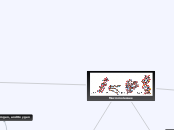jonka Sage LI 8 vuotta sitten
433
Macromolecues
Key biological molecules essential for life include nucleic acids, proteins, lipids, and carbohydrates. Nucleic acids, such as DNA and RNA, carry genetic information and are composed of nucleotides.

jonka Sage LI 8 vuotta sitten
433

Lisää tämän kaltaisia
Carrier proteins
Move molecues around
Fibrous and stringy
Provide support
Biological Catalysts
Responsible for movement
Defends the body from pathogens
Hydrogen bonds form shapes
Quaternary
Tertiary
Secondary
Primary
Made of
R group
Carboxyl group
Ammino Group
20 types
Single stranded
Creates proteins
Contains ribose sugar
Double stranded
Determines our genetic makeup
Contains deoxyribose sugar
5 carbon sugar + phosphate group + nitrogen base
Cholesterol
Triglycerides
3 fatty acids + glycerol
Hydrophobic, not water soluable
Usually come from plants
Liquid at room temperature
Contains double bonds in carbon chains
Usually come from animals
Solid at room temperature
No double bonds between carbon chains
Lactose
Milk sugar
Maltose
Used for germinating seeds
Sucrose
Used by humans
Glucose and fructose
Glycogen
Animal storage sugars
Starch
Root and seed glucose
Cellulose
Fiberous polymer, hard to digest